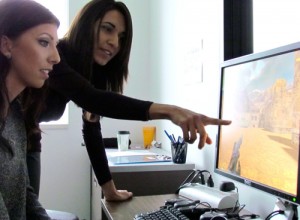
 Muniba Saleem, assistant professor of psychology, stands by as her research assistant, UM-Dearborn senior Morgan Showler, plays a video game.
Muniba Saleem, assistant professor of psychology, stands by as her research assistant, UM-Dearborn senior Morgan Showler, plays a video game.
So when Saleem conceived her next research topic, she looked no further than one of her favorite pastimes.
A social psychologist with a passion for video games, Saleem wanted to take a closer look at how people reacted to games that portray negative minority stereotypes.
“Content analyses reveal minority groups are mostly portrayed as the enemy or the target within video games,” she said. “Being an Arab video game character is almost synonymous with being a terrorist. There’s almost no positive representation of Arabs in video games.”
To analyze whether those negative stereotypes have a detrimental effect on people’s attitudes toward Arabs, Saleem randomly assigned 200 participants to play one of three video games for 30 minutes in a lab experiment.
Two of the games were versions of Counter-Strike, one with Arab terrorists and the other with Russian terrorists. The third game was a nonviolent golf game.
After their time was up, Saleem and Iowa State Professor Craig Anderson assessed the participants’ attitudes toward Arabs through implicit and explicit methods.
“We expected that people who played the Arab terrorist game would be more likely to perceive Arabs as hostile and aggressive and would have greater anti-Arab bias than people who played the nonviolent golf game,” she said.
The results supported Saleem’s expectations. In addition, participants were asked to draw pictures of what they deemed to be a “typical” Arab and Caucasian male after game play. Those who played the Arab terrorist video game were more likely to draw “typical” Arabs with weapons and negative affect, relative to participants who played the golf game.
But what really surprised Saleem was that people who played a Russian terrorist game also showed an increase in negative perceptions and attitudes toward Arabs.
“That was really bizarre because that Russian terrorist game had no direct Arab references within it, but we realized that the concept of terrorism is enough right now to activate Arab stereotypes in peoples’ minds,” she said. “You don’t even need to have a direct Arab reference. You just need to say ‘terrorism’ and people will automatically think of Arabs.”
The American Psychological Association’s Psychology of Violence research journal recently published the article, titled "Arabs as Terrorists: Effects of Stereotypes Within Violent Contexts on Attitudes, Perceptions, and Affect."
“With the popularity of gaming, social and behavioral scientists need
to understand the effects of the games on the players,” said College of Arts, Sciences, and Letters Dean Jerold Hale. “Professor Saleem’s research is critically important. It demonstrates clearly that games with violent and stereotypical content are not just harmless leisure time diversions.”
Saleem, however, understands many of her fellow gamers will disagree with her research findings, as the broader issue of whether violent video games influence aggressive behaviors remains a controversial topic.
“No researcher says that immediately after game play, you’re going to go out and shoot someone,” she said. “However, it is one of the identified risk factors of aggression, and like other risk factors, has an incremental effect in increasing your aggression levels. Assuming you don’t have other risk factors of aggression and you play violent video games, you’re probably not as aggressive to go out and shoot someone, but you probably are a little bit more aggressive than someone who hasn’t played these games.”



